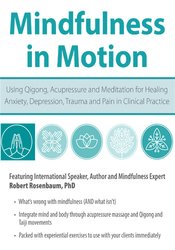

Imagine what it would be like for your clients to be free from anxiety, depression, trauma or pain. What if you could show your clients specific strategies to become more mindful and compassionate by immediately working with their concrete bodily experiences of themselves in the present moment?
This new workshop will be unlike any other mindfulness training you’ve received! Join experienced mindfulness presenter Robert Rosenbaum, PhD as he will give you an experiential packed workshop.
Robert will teach your clients through body movement and awareness that mindfulness meditation is accessible, beneficial and practical. By integrating mind and body through movements, acupressure massage and meditations of Dayan (Wild Goose) Qigong, learn how to apply these mindfulness techniques:
Mindfulness doesn’t live in your head–don’t miss this chance to integrate mindfulness in your practice tomorrow!!
| File type | File name | Number of pages | |
|---|---|---|---|
| Manual ZNM048190 (21.29 MB) | 40 Pages | Available after Purchase |

Robert Rosenbaum, Ph.D., has 30 years’ experience as a neuropsychologist, psychotherapist and behavioral medicine specialist. In addition to his numerous journal articles and book chapters on brief psychotherapy, he is also the author of the books Zen and the Heart of Psychotherapy; Walking the Way: 81 Zen Encounters with the Tao Te Ching and co-editor of What's Wrong with Mindfulness (and what isn't). He is entrusted as a Zen teacher by Sojun Roshi of Berkeley and San Francisco Zen Centers and as a senior teacher of Dayan (Wild Goose) Qigong by Master Hui Liu of the Wen Wu School.
Dr. Rosenbaum worked for over 26 years at Kaiser Permanente clinics in California, where at various times he was chief psychologist, head of the neuropsychological assessment program, developed the mindfulness-based behavioral portion of the chronic pain management program in Kaiser Oakland and started the first programs of Dayan Qigong (which subsequently spread to medical clinics throughout California). He also did research on brief psychotherapy, single-session therapy and psychotherapy integration.
In addition, he has been a Fulbright Professor at the National Institute of Mental Health and Neurosciences in India, the director of the doctoral training program at the California Institute of Integral Studies, and a consultant on brief psychotherapy to clinics and academic institutions in Australia, Japan, and Canada. Whenever he can, he spends several months a year hiking in the Sierras and the Himalayas.
Speaker Disclosures:
Financial: Robert Rosenbaum receives a speaking honorarium from PESI, Inc. He has no relevant financial relationships with ineligible organizations.
Non-financial: Robert Rosenbaum has no relevant non-financial relationship to disclose.
PART I - CONCEPTUAL FOUNDATIONS
Review of Mindfulness
Practical Neuroscience
Mind and Body: A Necessary Unity
PART II - EXPERIENTIAL LEARNING
Acupressure Self-Massage
Qigong and Taiji Movements
Body-Focused Sitting Meditations
Breath and Beyond the Breath
Please wait ...